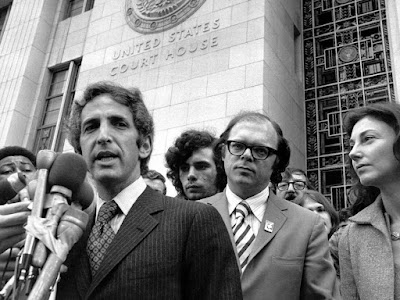In one of the quirky coincidences that history deals out, Daniel
Ellsberg died today at
age 92 on the eve of the fifty-first anniversary of the break-in at the offices
of the Democratic National Committee in the Watergate Hotel in Washington, D.C.
Ellsberg was a military analyst in the 1960s, disturbed by the gulf between
what the government was telling the public about the war in Vietnam and what he
was seeing behind the scenes.
After serving as a Marine, Ellsberg earned his doctorate at
Harvard and joined the RAND Corporation, where he learned to apply game theory
to warfare. By 1964 he was an advisor to Robert McNamara, who served as defense
secretary under presidents John F. Kennedy and Lyndon Johnson. In 1967,
Ellsberg was part of the team tapped by McNamara to compile a history of the
conflict in Vietnam to evaluate the success of different programs.
Ellsberg was concerned by investigators’ conclusions. The 7,000-page secret
government study detailed U.S. involvement in Vietnam from Harry Truman’s
presidency to Lyndon Johnson’s. It outlined how successive presidents had lied
to the American people, expanding the war with promises of victory even as the
costs of the war mounted and the chances of victory moved farther and farther
away.
Ellsberg copied the secret study and shared it with congressmen, who buried it.
Finally, Ellsberg shared the report with a New York Times correspondent
on the condition the reporter would only take notes and would not copy the
pages. But the correspondent broke the agreement, believing the documents were
“the property of the people” who had paid for them with “the blood of their
sons.”
On June
13, 1971, the New York Times began to publish what became known
as the Pentagon Papers, showing how presidents had lied to the American people
about the nation’s involvement in Vietnam. President Richard Nixon’s attorney
general, John Mitchell, warned the New York Times that the publication was
jeopardizing national security and warned that the government would prosecute.
The editors decided to continue publication—the Supreme Court
later agreed that the newspaper had the right to publish the information—while
Ellsberg leaked the report to other newspapers.
The study ended before the Nixon administration, but the president was deeply
concerned about it. The report showed that presidents had lied to the American
people for years, and Nixon worried that the story would hurt his
administration by souring the public on his approach to the Vietnam War.
Worse,
if anyone looked at his own administration, they might well find evidence of
his own secret actions in the Vietnam arena: the Chennault affair, in which a
Nixon ally undermined peace talks before the 1968 presidential election in
order to undercut Johnson’s reelection campaign, and what was then the
undisclosed bombing of Cambodia.
News of either could, at the very least, destroy Nixon’s reelection campaign.
Nixon became obsessed with the idea that the Pentagon Papers proved that
opponents were trying to sink his campaign for reelection.
Frustrated when the FBI did not seem to be taking an investigation into
Ellsberg seriously enough, in July
1971, Nixon put together in the White House a special
investigations unit to stop leaks. And who stops leaks?
Plumbers.
Officially known as the White House Special Investigations Unit, Nixon’s
“plumbers” burglarized the office of Daniel Ellsberg’s psychiatrist on September 9, 1971, hoping to find damaging information about
him that would discredit the Pentagon Papers. (Their burglary, showing gross
governmental misconduct, was later key to the dismissal of charges against
Ellsberg for leaking the report.)
Some of the plumbers began to work with the Committee to Reelect the President
(aptly called “CREEP” as its methods came to light) to sabotage Nixon’s
Democratic opponents by “ratf*cking” them, as they called it, planting fake letters
in newspapers, hiring vendors for Democratic rallies and then running out on
the unpaid bills, and planting spies in Democrats’ campaigns.
Finally, CREEP turned back to the plumbers.
Early in the morning on June
17, 1972, Frank Wills, a 24-year-old security guard at
the Watergate Office Building in Washington, D.C., noticed that a door lock had
been taped open. He ripped off the tape and closed the door, but on his next
round he found the door taped open again. He called the police, who found five burglars
in the Democratic National Committee headquarters located in the building.
The White House denied all knowledge of what it called a “third-rate burglary
attempt,” and most of the press took the denial at face value. But two young
reporters for the Washington Post, Bob Woodward and Carl Bernstein,
followed the sloppy money trail behind the burglars directly to the White
House.
The fallout from the burglary gained no traction before the election, which
Nixon and Vice President Spiro Agnew won with an astonishing 60.7 percent of
the vote. But the scandal erupted in March 1973, when one of the burglars, James W. McCord, Jr.,
wrote a letter to Judge John Sirica before his sentencing, saying that he had
lied at his trial, under pressure to protect government officials.
McCord had been the head of security for CREEP, and Sirica,
known by reporters as “Maximum John,” later said, “I had no intention of
sitting on the bench like a nincompoop and watching the parade go by.”
Sirica made the letter public, White House counsel John Dean promptly began
cooperating with prosecutors, and the Watergate scandal was in full swing. On August 9, 1974, Nixon became the first president in American
history to resign.
Ellsberg decided to release the Pentagon Papers to alert the American people to
the fact that their government was lying to them about the Vietnam War. But he
helped set in motion a series of events that determined the shape of the
political world we live in today.
—Heather Cox Richardson
Notes:
https://www.washingtonpost.com/wp-srv/national/longterm/watergate/stories/siricaobit.htm
https://www.law.cornell.edu/supremecourt/text/418/683
https://www.nytimes.com/2023/06/16/us/daniel-ellsberg-dead.html
https://www.mtsu.edu/first-amendment/article/505/new-york-times-co-v-united-states
https://archive.nytimes.com/www.nytimes.com/interactive/us/2011_PENTAGON_PAPERS.html?_r=1

No comments:
Post a Comment
Note: Only a member of this blog may post a comment.